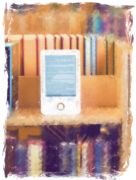A book is forever
It seems now to be an established fact that sooner or later the digital publishing will replace the paper. The advantages are many, both for publishers and authors, but what about readers? Well, lower prices, the possibility of carrying around a whole library in a tablet as big as a paperback… you would say «yes, for them too» even if in the end do you really need to always take with you a few hundred titles? Yet there is a problem, and if it is not resolved quickly in the same way in all countries, many readers might change their mind on the convenience to purchase electronic books.

I have about 5,000 books at home, mostly fiction but also essays, textbooks, and some books of poetry and photography. I have inherited some of these, about two hundreds, from my grandfather and, when my parents will be fading away, my sister and I will have a few thousand more books to share out, mostly 50% in Italian and 50% in English language. Obviously, when I die, almost all of my books will be inherited by my daughter who has already begun, however, to make her personal library. She already has several hundred volumes and every year she purchases a few dozen more, both new and second-hand, mostly in Italian but also in English and French, as well as some study texts in Latin and ancient Greek. Furthermore, if we consider also my common-law wife’s books and those who, in turn, she will inherit at his father’s death, probably, taking in account both families, we should have more than ten thousand volumes.
Some of these books are quite old, since they were published at the turn of the Second World War, i.e. from 1940 to 1950. There are also some that date back to the early 1900s and others — really few, anyway — that are even older. Honestly, they are not rare books, but getting your hands on a one century old publications, or even older, it is quite impressive. A couple of books have more than three centuries, but this is not that unusual in Italy, where the books are conveyed, in some families, generation after generation, passing more or less intact through the centuries. A friend of mine had several books in his library published in 1600s and one in 1500s, all in excellent condition.
The paper turns yellow, the ink fades, and if you are not careful, mold and insects can damage the various pages and the cover, but with a little care a four century old paper book can reach almost intact the present day. So a book is much more than a simple written work, that is, a real piece of history. Historic publishers which no longer exist, editions that have been amended several times over the centuries, texts published in limited and numbered editions: almost all of this material is invisible in a world that thinks that it is real only what it is posted on-line. Until a few decades ago there was not even a single Italian book that had an ISBN and that code is still scarcely used. You will never find many titles and authors by Google, not even as a reference, because most of the online catalogs refers to books for sale, not to texts that are now present only in private libraries.

Okay, you may say to me, quite interesting but to what end all this? Well, this article came to my mind reading a news story, that is, the fact that Bruce Willis, the famous American actor, had expressed the desire to bequeath his collection of music purchased from iTunes to his children, and that Apple had objected saying that it was not possible. Later on, that news was denied by the wife of Willis, but not about the clause in question, but only about the fact that Bruce wanted to sue Apple. Therefore the problem is real: many people do not know, in fact, but in reality, when you buy a song on iTunes, you are not acquiring its property but only a license of use. This does not include the passing of the baton, that is, it is not possible to transfer it to others, even in the event of death of the licensee.
Now, the point is that this problem is not only related to the pieces of music but also to digital books. When you buy an e-book, not necessarily you are getting its ownership. This has serious implications. In fact, if my library of 5,000 volumes were all digital, my daughter would not receive even a single book at my death. They would return in practice to those who “sold” them to me. Imagine if this had happened in the past. Today many of us would not have on their shelves any books purchased from our parents or grandparents, or those passed from one generation to the next one through the centuries. All volumes that today are no longer published and therefore would have been lost forever.
Anyway I went on the Amazon website, one of the largest distributors of digital books and, although with some difficulty, since it is not so easy to discover it, I found the following clause [Amazon.com]:
Use of Kindle Content. Upon your download of Kindle Content and payment of any applicable fees (including applicable taxes), the Content Provider grants you a non-exclusive right to view, use, and display such Kindle Content an unlimited number of times, solely on the Kindle or a Reading Application or as otherwise permitted as part of the Service, solely on the number of Kindles or Supported Devices specified in the Kindle Store, and solely for your personal, non-commercial use. Kindle Content is licensed, not sold, to you by the Content Provider. The Content Provider may include additional terms for use within its Kindle Content. Those terms will also apply, but this Agreement will govern in the event of a conflict. Some Kindle Content, such as Periodicals, may not be available to you through Reading Applications.
Limitations. Unless specifically indicated otherwise, you may not sell, rent, lease, distribute, broadcast, sublicense, or otherwise assign any rights to the Kindle Content or any portion of it to any third party, and you may not remove or modify any proprietary notices or labels on the Kindle Content. In addition, you may not bypass, modify, defeat, or circumvent security features that protect the Kindle Content.

By the way, three years ago, Amazon decided to delete the two Orwell’s novels “1984” and “Animal Farm” from the Kindle of all users since they had been sold without copyright and therefore they were in all respects unauthorized copies [The New York Times]. So, having the ability to remotely access the contents of the Kindle, Amazon removed all purchased copy of the two titles without prior notice. Obviously that company gave buyers automatic refunds, but most readers did not like that behavior and, in fact, a young student sued Amazon for deleting one of those titles and won [CBS News].
So, at least in case of Amazon, as well as of Apple for music, buying a digital book implies only purchasing a license, although this issue is still open and not well defined, not least because every country has different laws and in any case the governments that have already faced the problem are really few. Of course, in the future, when most of the books, music, movies, and TV series will be distributed only in electronic form, this matter will have to be clarified, possibly with international regulations which apply in all countries, otherwise the situation could further complicate.
With regard to digital books there is also another consideration: the format. I am not referring to the book size or type of binding, of course, but to text encoding. In an old box I still have several 5-inch floppy disks. Somewhere I also have a reader, if that works, and maybe I can still think of reading them by connecting that drive to my current computer, but I doubt I would be able to read most of the files that are inside because the format used could only be read by programs that no longer exist and I doubt that there is some converter for most of them. In some cases, probably, I would not even know which was the program I used to create them. Some of these files contain text, images or other graphical elements, some music and sounds.
We assume that the formats used today will be valid forever, but history teaches us that it is not true; by the way, it is not always easy to find programs that read or are able to convert old formats. For example, try reading an old graphic file in DRW or SYM format created by Lotus Freelance Graphics for Windows 3.1. A mad venture.

So what will happen when the Kindle or iPad will be obsolete and forgotten as the Sinclair QL or the Commodore Amiga are nowadays? There will still be systems that can read or convert those formats? Maybe, maybe not. This could happen in ten, fifty or perhaps two hundred years, but if you consider the fact that even today we can read the Dead Sea Scrolls, which have more than two thousand years, then how long does not matter at all: it is very likely that much of the current literature may be lost simply because the digital ink is much more volatile than the Indian one.
What can we conclude from all this? Of course it is unthinkable to stop the digital revolution and more and more texts will be published in the coming years also in digital format, or even only in that format, but if we do not define clearly the question of transmissibility of the license, we risk of losing what is perhaps the most significant value of a book, that is, its ability to travel through time and transmit its contents to a generation after the other, from parents to children, grandchildren and so on. The books are in fact time machines for ideas and culture.
In practice, a real book is forever.




















Please use Facebook only for brief comments.
For longer comments you should use the text area at the bottom of the page.
Facebook Comments